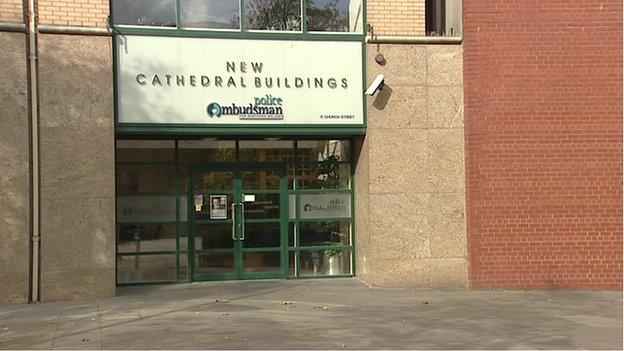Police Ombudsman in major investigation into 'IRA informer murders'
- Published

The Police Ombudsman's Office is investigating claims that the British security forces could have prevented some IRA murders and that they allegedly protected spies within the IRA from prosecution for murder
A police watchdog has "broadened" its investigations into a series of IRA murders, examining claims UK security forces could have stopped the killings.
The murders took place during the 1980s and 1990s and the IRA claimed the victims were "informers".
But victims' families believe they died to protect British agents in the IRA.
Since 2007, Northern Ireland's Police Ombudsman has examined claims the UK "protected" IRA killers, external, but has now grouped cases in a major investigation.
'Protected from investigation'
A Police Ombudsman's Office spokesman said it arose from "a number of separate complaints made by members of the public and from matters referred to it by the Police Service of Northern Ireland (PSNI)".
"They included allegations that some murders carried out during this period could have been prevented and that a number of people were subsequently protected from investigation and prosecution," the ombudsman's statement added.
The Guardian newspaper has reported that up to 20 murders are now being examined, external as part of the wider inquiry.
It is understood that while some of the killings may have been looked into as individual cases by the ombudsman over the years, this is the first time the murders have been grouped for investigation.
The ombudsman's spokesman confirmed that its larger inquiry began more than a year ago, but added: "We are at a stage where we can now confirm that we are carrying out such an investigation."
'Exposing collusion'
The Belfast law firm, KRW Law, is dealing with 11 cases that have been included in the ombudsman's investigation, nine of which involve victims who were murdered by the IRA due to claims they were informers.

Solicitor Kevin Winters, whose firm is acting for about half of the families involved, welcomed the Police Ombudsman's Office decision to deal with the murder cases in a "thematic" investigation
Solicitor Kevin Winters said these families were the "last to come to the table" in terms of conflict resolution because of the "stigma" that still surrounds the deaths of their relatives. Many of the families taking legal action still live in strongly republican areas.
Mr Winters said his firm had been dealing with all 11 cases in a linked "thematic" manner for some time but were notified earlier this month that the Police Ombudsman's Office has now taken the same approach.
"As a law practice representing a substantial number of clients affected by the legacy of the conflict, and having worked on their behalf with the Office of the Police Ombudsman for Northern Ireland since its inception, we welcome this initiative to undertake thematic investigations into multiple murders, which we have long been advocating for.
"The initiative is clearly right in terms of the process of delivering truth to victims and in terms of the operation of the office and exposing collusion as a state practice during the conflict responsible for deaths which could have been prevented," Mr Winters added.